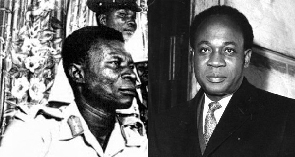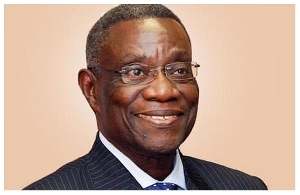Last Wednesday, November 26, Peace FM’s ‘Working Time’ programme presenter, Kofi Kum Bilson, reminded the nation of the birthday anniversary of Major-General Emmanuel Akwasi Kotoka, co-leader of the infamous coup d’etat that ended the rule of Dr Kwame Nkrumah.
In doing so, this presenter posed a question which very few Ghanaians do not dare to publicly answer: Was Kotoka a hero or a villain? The reason people do not want to be drawn into the debate is that most often, it is painted with the brush of ethnicity, and, therefore, degenerates into emotional and hateful war of words.
Well, apparently it is not wholly true that no-one wants to answer this question. I know one Ghanaian who thinks that Kotoka deserves a place in history. He is Professor Mike Ocquaye, the learned political scientist, (MP) and the former Second Deputy Speaker of Parliament. In an interview on Accra’s Citi FM, Prof. Ocquaye said that Dr Nkrumah assumed too much power for himself, becoming a 'dictator' in a one party state, which Ghanaians at the time did not support.
Well, apparently it is not wholly true that no-one wants to answer this question. I know one Ghanaian who thinks that Kotoka deserves a place in history. He is Professor Mike Ocquaye, the learned political scientist, (MP) and the former Second Deputy Speaker of Parliament. In an interview on Accra’s Citi FM, Prof. Ocquaye said that Dr Nkrumah assumed too much power for himself, becoming a 'dictator' in a one party state, which Ghanaians at the time did not support.
Three weeks ago, on this same page in this same paper, I had occasion to cite Kwame Nkrumah’s sins, but I did so only to remind myself that Nkrumah was human.
On this page today, I am resurrecting the debate: Is it right for us to have two memorials erected in honour of two personalities each of whose deeds contradict Ghanaians’ love for the other?
I wish to submit that by our decision to immortalise Kotoka for his involvement in the 1966 coup, Ghana is living not only a lie but also a contradiction. How can we sing the praise of a man whose claim to glory is that he put brakes to a nation’s aspirations; whose only national deed is that he overthrew the government of a man who (we have grown up later to discover) was our true messiah – and remains so till this day? If we rejoiced at his overthrow in 1966, we know better now.
How can we build a memorial park after Nkrumah and spend millions of dollars wooing tourists, especially African Americans, to pilgrim to the land of his birth and yet on their arrival in the land of their ‘god’, the first thing their eyes behold is a monument named after the very soldier who was responsible for pushing this ‘god’ from his rightful pedestal with the help of America’s Central Intelligence Agency(CIA).
To name a day after Nkrumah, to legislate a holiday in his honour and yet bestow honour on his detractor is a national contradiction. Nkrumah was no angel – on that we all agree – but we can’t sing a song that simultaneously canonises him as a saint and demonises him as a devil to the point where his enemies are elevated to the realms of angels.
Nkrumah was a dictator, we say; but how make this accusation and continue to compose eulogies to Mahathir Mohammed of Malaysia, Lee Kwan Yew of Singapore and, currently, Paul Kagame of Rwanda and John ‘Bulldozer’ Magufuli of Tanzania? Even as I write, there is a promotion ongoing by an Accra radio station asking Ghanaians to join on a trip to see the “wonders” of Rwanda chalked by Kagame.
Is it not a fact that today in Rwanda, Kigame has more than a handful of critics in his country? I also do not like some of his tactics but it is a fact that no deed by any leader anywhere in the world since God created Adam has found 100 per cent approval. No creature of God is all saint and all demon. That is why those of us who write Nkrumah’s good deeds on brass do so not oblivious of his sins. But is that reason to put my hand in the gloves of his enemy?
I believe Kweku Baako’s account of the events of June 4: he was a part of it. Even though he was not one of the plotters of the insurrection, he was, like biblical Saul, one of the civilians at whose feet, literally the coup plotters laid their cloth as they persecuted members and functionaries of the overthrown regime.
Kweku’s account is that the real reason which the architects of the June 4, uprising gave to themselves for killing the ‘Generals’ was that it was an act to eliminate all who had taken part in all previous coups in Ghana. If that is the reason for the inclusion of General Afrifa in the list of the insurrectionists and his subsequent brutal murder at the firing range, what is the reason for honouring Kotoka, Afrifa’s accomplice? Is it because he was killed for his part in the coup? Well, Afrifa has also been killed for the same reason.
Kotoka was no hero; but he was also no villain. I regret his cold-blooded murder on April 17, 1967 by Lieutenant Moses Yeboah and Lieutenant S.B. Arthur.
Naming an airport after him, however, is an overkill.
Opinions of Wednesday, 2 November 2016
Columnist: Enimil Ashon















